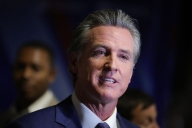You have /5 articles left.
Sign up for a free account or log in.
When I first heard about it, I said to myself, “How do I kill this idea?”
My chancellor wanted to participate in a reality show. What a nightmare!
It was during my first months on campus. A new job, at a University of California campus on the rise. Great plans to help this campus break into the national consciousness. So very many heavy, strategic communications activities to organize.
And now a reality show. What a nightmare!
My internal dialogues simmered: “Boy, they really need me here. Who in his right mind would want to engage with this side of network programming? We have no editorial control! What if they catch something bad on film and there’s hell to pay?”
How could I, a communications professional with years of university experience, embrace such a thing? I had little choice. The conversations had been going on for more than a year. Welcome to campus, James. We’re doing “Undercover Boss.”
Getting a real dose of reality reminded me, with extreme clarity, that: (1) I don’t know everything; (2) authenticity counts; and (3) I don’t know everything.
Get Us in The New York Times
What does it take to get someone’s attention these days? How do we break through the clutter we created, along with thousands of other distinguished research universities and fine liberal arts schools and wonderful community colleges?
Given the lives we transform, the discoveries we create, the communities we help, we all deserve to be on the front page of The New York Times. It’s a fact I have been reminded of frequently, across 25 years’ worth of media relations and communications management at NYU, UCLA, Thunderbird, USC, UC Merced, and a few places in between.
We hear it from students, professors, board members, parents of students: “Why can’t you get The New York Times or The Wall Street Journal to write about us? If we just told our story better, we’d get more publicity!”
(Did you ever find yourself at a loss for words? Not because you can’t think of anything to say -- rather, because there is too much to say? You want to take the NYT, WSJ, LAT or WaPo, roll it up, shake it wildly, and say: “Well why don’t you just pick which of these stories should be bumped off the front page for a smarmy feature on our campus? The major political story? The major economic story? The compelling bus strike? The investigative piece on misuse of public funds?”)
But of course, we don’t do so. We don’t yell. Not externally, at least. We put on that serious “trust-me-I’m-a-communications-professional” look and stammer a few things about our recent pitches (and successes, if any) to The Gray Lady. Our comprehensive strategy for national and global communications domination. Our extensive experience talking with journalists and meeting their needs and those of their readers. That’s how I felt in this situation and what I’d have liked to have said out loud.
Lessons learned: (1) I don’t know everything; (2) authenticity counts; and, (3) I don’t know everything.
In the build-up to the filming, only a few of us on campus were allowed to know about the project. We drove others crazy asking for help for a special initiative we couldn’t discuss. We signed legal nondisclosure forms that included the prospect of personal liability of six figures if we broke the code. That’s six figures per incident! I didn't even tell my wife. (About the show. If she knew about the show that’d be O.K., probably, but I didn’t know how to tell her I just signed the rest of our financial lives away if we slipped up. So I didn’t tell her anything.)
Behind the scenes, the chancellor’s top associates, sworn to secrecy, then begin asking managers across campus to do things we’d usually never do. (“Can you please find us staff and faculty members with compelling stories who wouldn’t mind signing their own nondisclosure forms, and then will work and be filmed for a few hours with a strange man named ‘Pete?’ Um, and trust us, this is all above-board?!”)
Our Protagonist
Enter our protagonist, “Pete.” Chancellor Timothy P. White. Dude is so sure this reality show segment will be great for our campus that he agreed to shave his own head to make sure he’d look different while filming took place for “Undercover Boss.” One of the reasons I came to UCR -- along with several other newbies here -- is Tim White.
White had his own personal journey: immigrant to California from Argentina as a kid. Community college at Diablo Valley in the Bay Area, then a bachelor’s from Fresno State University and a master's from Cal State Hayward (now Cal State East Bay), then finally a Ph.D. at UC Berkeley.
Despite his serious chops as an academic, Chancellor White is an authentic person first, an academic leader second. He makes others comfortable, he’s funny, he’s direct. Those of you who watched the show on CBS last Sunday saw what I mean. Chancellor is the real deal -- on a reality show! I’m not quite sure how one charismatic, grounded person can hold such sway over the camera, over a crowd. But one thing that comes through is that he’s able to laugh at himself, take a ribbing, and stay on message.
And I’m also finding out that he’s a pretty good teacher.
What I learned: (1) I don’t know everything; (2) authenticity counts; and, (3) I don’t know everything.








